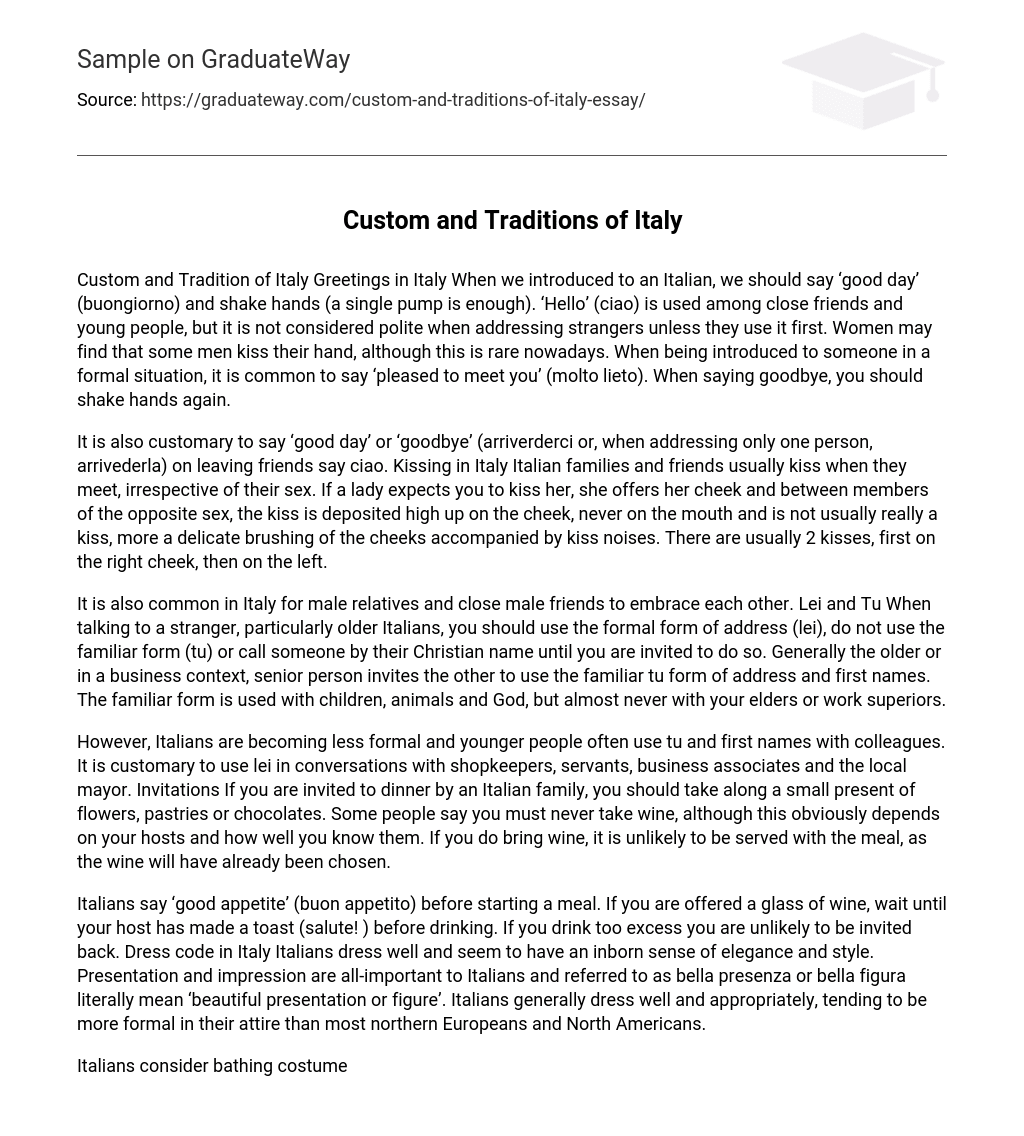Custom and Tradition of Italy Greetings in Italy When we introduced to an Italian, we should say ‘good day’ (buongiorno) and shake hands (a single pump is enough). ‘Hello’ (ciao) is used among close friends and young people, but it is not considered polite when addressing strangers unless they use it first. Women may find that some men kiss their hand, although this is rare nowadays. When being introduced to someone in a formal situation, it is common to say ‘pleased to meet you’ (molto lieto). When saying goodbye, you should shake hands again.
It is also customary to say ‘good day’ or ‘goodbye’ (arriverderci or, when addressing only one person, arrivederla) on leaving friends say ciao. Kissing in Italy Italian families and friends usually kiss when they meet, irrespective of their sex. If a lady expects you to kiss her, she offers her cheek and between members of the opposite sex, the kiss is deposited high up on the cheek, never on the mouth and is not usually really a kiss, more a delicate brushing of the cheeks accompanied by kiss noises. There are usually 2 kisses, first on the right cheek, then on the left.
It is also common in Italy for male relatives and close male friends to embrace each other. Lei and Tu When talking to a stranger, particularly older Italians, you should use the formal form of address (lei), do not use the familiar form (tu) or call someone by their Christian name until you are invited to do so. Generally the older or in a business context, senior person invites the other to use the familiar tu form of address and first names. The familiar form is used with children, animals and God, but almost never with your elders or work superiors.
However, Italians are becoming less formal and younger people often use tu and first names with colleagues. It is customary to use lei in conversations with shopkeepers, servants, business associates and the local mayor. Invitations If you are invited to dinner by an Italian family, you should take along a small present of flowers, pastries or chocolates. Some people say you must never take wine, although this obviously depends on your hosts and how well you know them. If you do bring wine, it is unlikely to be served with the meal, as the wine will have already been chosen.
Italians say ‘good appetite’ (buon appetito) before starting a meal. If you are offered a glass of wine, wait until your host has made a toast (salute! ) before drinking. If you drink too excess you are unlikely to be invited back. Dress code in Italy Italians dress well and seem to have an inborn sense of elegance and style. Presentation and impression are all-important to Italians and referred to as bella presenza or bella figura literally mean ‘beautiful presentation or figure’. Italians generally dress well and appropriately, tending to be more formal in their attire than most northern Europeans and North Americans.
Italians consider bathing costumes, skimpy tops and flip-flops or sandals with no socks strictly for the beach or swimming pool, and not the street, restaurants or shops. They also choose the occasions when they wear jeans carefully, as these are not thought appropriate for a classy restaurant or church. Other Customs If you have a business appointment with an Italian, he will expect you to be on time, although he will invariably be 5 or 10 minutes late. If you are going to be more than 5 minutes late, it is wise to telephone and apologies. Italians usually exchange business cards (biglietti de da visita) on business and social occasions.





